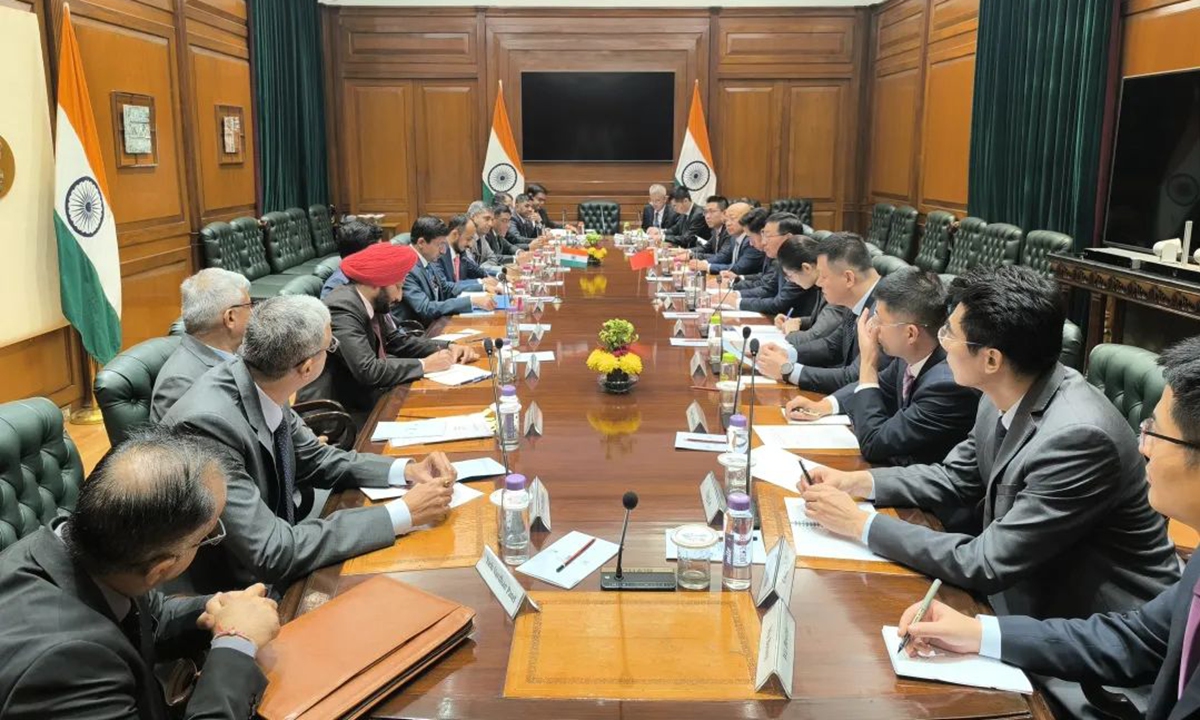China, India hold 32nd meeting of working mechanism on border affairs, agree to safeguard peace and stability

Photo: The Department of Boundary and Ocean Affairs of the Chinese Foreign Ministry
China and India held the 32nd meeting of the Working Mechanism for Consultation & Coordination on China-India Border Affairs (WMCC) on Thursday in New Delhi, and the two sides agreed to maintain communication through diplomatic and military channels, and safeguard sustainable peace and stability in the border areas, according to a release from Chinese Foreign Ministry on Friday.
Director-General of the Department of Boundary and Ocean Affairs of the Chinese Foreign Ministry Hong Liang and Shri Gourangalal Das, Joint Secretary (East Asia) of India's Ministry of External Affairs, co-chaired the 32nd meeting. Representatives from the foreign affairs, defense, interior, and immigration departments of both countries participated.
Both sides positively assessed the solutions reached on border-related issues and agreed to continue implementing them comprehensively and effectively, while taking measures to further ease the border situation. Following the important consensus reached by the leaders of both countries, the meeting focused on preparations for the next round of special representatives' talks on the China-India border issue, said the release.
The two sides also agreed to continue leveraging the role of the border negotiation mechanism, maintaining communication through diplomatic and military channels, and safeguarding sustainable peace and stability in the border areas, according to the release.
The Thursday WMCC meeting is the first working-level meeting between China and India publicly reported following the leaders' meeting in Kazan. The main purpose may be to assess the implementation of agreements and lay the groundwork for the resumption of the China-India special representatives dialogue mechanism, Qian Feng, director of the research department at the National Strategy Institute at Tsinghua University, told the Global Times on Friday.
The meeting may further strengthen the role of the WMCC in jointly maintaining peace and stability along China-India border areas, exploring peaceful solutions, and fostering an environment that facilitates the swift return of bilateral relations to a stable and healthy trajectory, said Qian.
As various levels of meeting mechanisms, communication dialogues, and cooperation continue to develop, issues such as visas, direct flights, and cultural exchanges, which are key barriers to the healthy growth of bilateral relations, may be raised in the dialogues, said Qian, noting that the positive atmosphere fostered by the China-India leaders' meeting in Kazan has played a crucial role in addressing the negative factors affecting the two countries' economic and trade relations.
However, the issue won't be resolved immediately, and building mutual trust is a gradual process. Both sides should be working toward each other to promote bilateral ties, said Qian.


